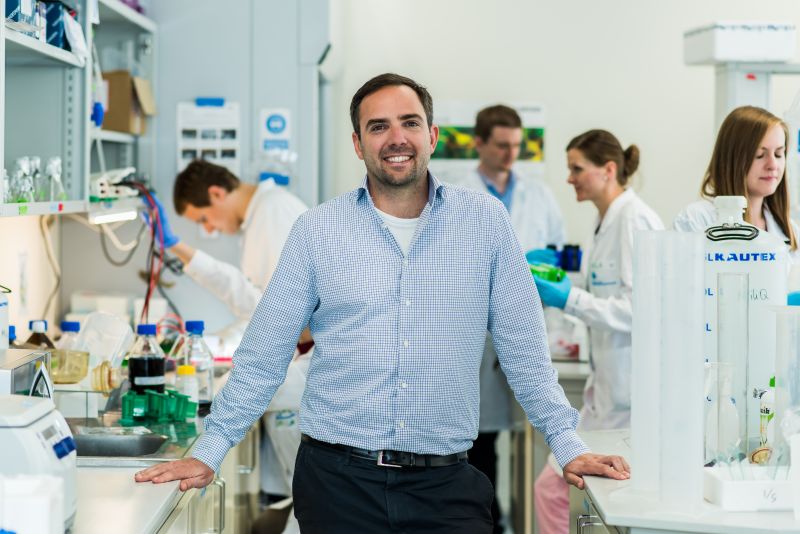Charging the Code - insights into tRNA Modification Enzymes
Speaker: dr Sebastian Glatt (Max Planck Research Group Leader z Małopolskie Centrum Biotechnologii UJ, Kraków)
Talk: Charging the Code - insights into tRNA Modification Enzymes
Time: 15th March 2019, 9:00 am
Venue: Intercollegiate Faculty of Biotechnology, Abrahama 58, hall 042
 My whole scientific career is driven by a deep fascination for the complex molecular mechanisms that allow cells to reproduce, adapt to changing environmental conditions and differentiate into specialized cell types by the activation of specific gene expression programs. These processes are particularly important in multi-cellular organisms, as each individual cell carries the identical genetic information, but needs to produce selected sets of proteins depending on the specialized function of the respective cell type and different external triggering signals. Protein synthesis can be subdivided into different successive processes, called transcription and translation, which are both susceptible to specific regulatory mechanisms. Whereas, transcription describes the production of mRNA molecules from activated genes by RNA polymerases, the subsequent process describes the translation of mRNA encoded sequence information into correctly assembled chains of linked amino acids. During the final step, these peptide chains fold into their correct and enzymatically active three dimensional structure due to their intrinsic properties or with the help of associated chaperoning factors.
My whole scientific career is driven by a deep fascination for the complex molecular mechanisms that allow cells to reproduce, adapt to changing environmental conditions and differentiate into specialized cell types by the activation of specific gene expression programs. These processes are particularly important in multi-cellular organisms, as each individual cell carries the identical genetic information, but needs to produce selected sets of proteins depending on the specialized function of the respective cell type and different external triggering signals. Protein synthesis can be subdivided into different successive processes, called transcription and translation, which are both susceptible to specific regulatory mechanisms. Whereas, transcription describes the production of mRNA molecules from activated genes by RNA polymerases, the subsequent process describes the translation of mRNA encoded sequence information into correctly assembled chains of linked amino acids. During the final step, these peptide chains fold into their correct and enzymatically active three dimensional structure due to their intrinsic properties or with the help of associated chaperoning factors.
During my doctoral thesis I have been studying the consequences of deregulated protein synthesis, leading to an overproduction of certain proteins that are essential for the development of human squamous cell carcinomas. During my postdoctoral time, I have been involved in different basic research projects that focused on understanding the fundamental structural and functional aspects of transcriptional and translational regulation. In detail, I have been studying the structure and function of specific and general transcription factors, which are needed to recruit RNA polymerases and activate gene transcription. In addition, I have been involved in the structural dissection of RNA polymerases themselves and so called chromatin remodelling complexes, which regulate the access of all the above described factors to their respective DNA binding sites in the context of the tight network of condensed chromatin. For most of the above mentioned projects, I have been involved through direct mentoring/supervision of PhD students or contributed my technical expertise in structural biology and protein biochemistry techniques.
My prime scientific interest focused on the structural and functional characterization of specific regulatory events of the translation machinery. In detail, the speed and continuity at which ribosomes move along mRNAs during the elongation phase of translation varies with the nucleotide sequence, influencing not only the rates but also the folding and stability of the emerging nascent polypeptide chains. As tRNA selection in the A-site of ribosomes is a rate-limiting step during elongation phase, the use of synonymous codons and specific base modifications in the wobble base position of tRNAs influences local elongation speed and aids co-translational protein folding. As errors in these tRNA modifications cascades are causing intellectual disabilities, neurodegenerative diseases and cancers in humans, they have caught my special attention over the last years. Therefore, my Max Planck Research Group at the MCB is continuing previous efforts to understand the structure and function of the highly conserved eukaryotic Elongator complex, responsible for conducting specific chemical modifications in the wobble base position of tRNAs. In detail, we use x-ray crystallography and electron microscopy to obtain snapshots of the involved proteins and try to deduce their biochemical activities from the observed structures. Subsequently, we employ different in vitro and in vivo approaches to validate and challenge our structure based working hypotheses. In addition, together with various national and international collaboration partners we have recently started to work on related tRNA modification pathways and other translation control pathways, that are important for stem cell maintenance and differentiation.
Last but not least, I would like to highlight that these cellular mechanisms under investigation are not only highly conserved, vaguely characterized and extremely complex, but are also of high clinical relevance and importance. Therefore, I believe that the results and scientific insights from our ongoing research projects will pave the way for the development of novel diagnostic and therapeutic strategies to improve the life span and life quality of the affected patients.





